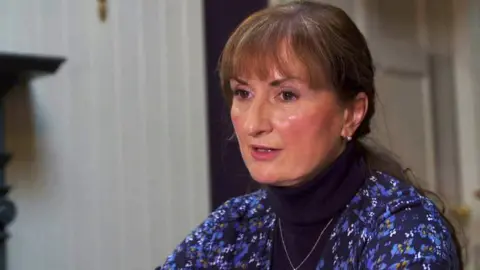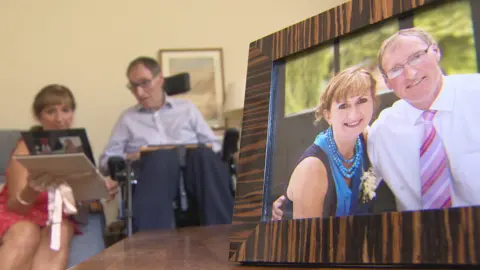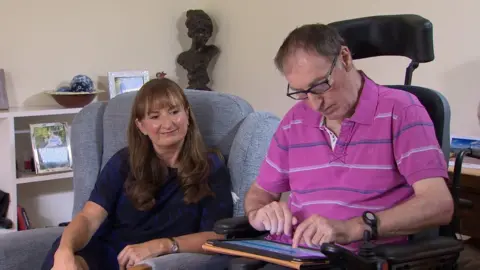Richard Selley: Wife's 'awful' journey to husband's assisted death
 BBC
BBCThe wife of a former teacher who ended his life at a Swiss euthanasia clinic last month has said much of the experience was "awful".
Elaine Selley's husband Richard battled motor neurone disease (MND) for four years and ended his life at Dignitas in Zurich on 6 September.
He had campaigned for euthanasia laws to be introduced in Scotland.
Mrs Selley said she believed he made the right choice but having to travel abroad made it much harder to bear.
Speaking for the first time since his death, she told BBC Scotland's The Nine: "I think you are numb and you are in shock and I think there are moments where I think it happened yesterday and there are moments when I think it has happened to somebody in a different life.
"I think that experience now is part of my experience in life and I have to process and deal with that and it will be with me forever."

Mrs Selley said that the reality of leaving Scotland and their loved ones behind to make that final journey to Zurich was brutal, especially seeing their children for the last time at the airport.
She said: "It was having to say goodbye to people you loved at the airport surrounded by everybody on their way to Spain and Portugal on their holidays. It was awful.
"We were sitting reading these really comforting, beautiful emails we were being sent and there were a few tears shed when we were reading them, when we were sitting with everybody else in the departure lounge. "

'I have tried to live a dignified life but have to travel to achieve a dignified death'
Richard Selley campaigned for a change to laws on assisted dying right up until his death in September.
In July he wrote an open letter to MSPs calling for reform.
He wrote a blog and a book on the issue and made videos on the emotive subject, the last being shared in the week he travelled to Switzerland to end his life.
The 65-year-old said that having to be able to fly meant he chose to die earlier than he would otherwise have wanted.
He said that if an assisted death was possible in Scotland, he would have been able to die at a time of his choosing, at home.
He said: "I hope that members of the Scottish Parliament support an assisted dying bill in the future.
"I think the momentum for a change in the law is growing."

Mrs Selley travelled with Richard and his brother Peter from their home in Glenalmond, near Perth. They spent two days in a hotel before they set foot in the clinic itself.
Away from his home support, she said Richard was vulnerable, and in pain and distress.
Mrs Selley said it was an upsetting experience but that watching him in that final 48 hours made her realise how sick he was and that he had "taken it to the wire".
Five weeks ago, at 12:40 on 6 September, Richard took his own life.
His wife believes he made the right decision and she will continue Richard's campaign to make euthanasia legal in Scotland.
'He really had had enough'
She said: "We wish we weren't there and we didn't have to go through this.
"But for Richard and for his pain and his distress in that moment in time, which was far worse than it was at home, we knew he was doing the right thing for him.
"He really had had enough and wanted out of it and although we didn't want to lose him, didn't want it to happen and it was scary, it was the right thing for him."
Opponents of assisted dying legislation argue that introducing such a law in Scotland risks exposing people to abuse, coercion and exploitation.

Mrs Selley disagrees: "Some people are quite happy to let nature take its course but Richard wanted to take charge of his end of life experience, to ensure it was peaceful and he wasn't in any pain. And I can't see any opposing argument to that if there are safeguards in place.
"These are terminally ill people in the last phase of their life who have no chance of being cured, and there is nothing that can be done, why shouldn't they make a choice?"
Previous bids to introduce new legislation have failed to get through the Scottish Parliament.
Attempts to change the law on assisted dying issue were made by the MSP Margo MacDonald, who died in April 2014 after a long fight against Parkinson's.
The idea was put before Holyrood twice, but her bills failed to receive parliamentary backing.
